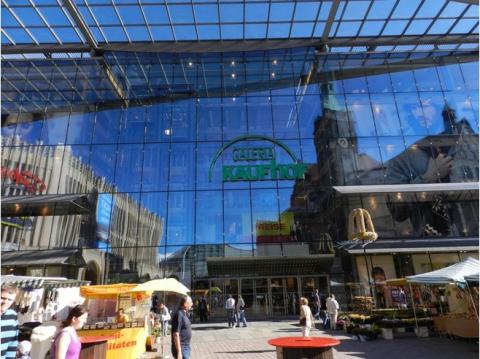The Smoking Gun in the NSU Trial?
By Carolyn Yeager

All-glass facade of the new Kaufhof Department Store in Chemnitz, Germany.
Co-defendant in the bizarre NSU (National Socialist Underground) trial and also the prosecution's star witness, Carsten S. gave his testimony in early-to-mid-June in the Munich courtroom.
Update! see below
I have posted what's been said in the news media, for example here and here, but some details I only managed to talk about on a radio program, not recognizing at that time how important they would become.
The Der Spiegel International article of June 12, 2013 gave these details:
The NSU stands accused of murdering 10 people between 2000 and 2007.
Carsten S. had already admitted to procuring a gun for the murderous neo-Nazi trio known as the NSU.
[...]
the meeting referenced by Carsten S. took place in a café in the Galeria Kaufhof department store in Chemnitz. It was, in fact, during that meeting that Carsten S. handed over the Ceska handgun he had obtained for the trio -- a weapon that was used to kill nine of the 10 murder victims.
[...]
He told the court that Ralf Wohlleben, a co-defendant who stands accused of providing material support to the NSU, knew that the trio had committed serious crimes. Wohlleben, S. said, spoke on the phone with the NSU trio in his presence and afterwards chuckled and reported that the three had shot someone.
In a prior Der Spiegel International article of June 6, 2013, this testimony was reported:
But Carsten S. is key. He is thought to have been the one who provided the murder weapon used in all 10 of the killings, a Ceska 83 pistol with a silencer. "I remember," said S. "It was supposed to be a German manufacturer if possible. A handgun with ammunition."
Carsten S. is thought to have assisted the NSU in many other ways as well, but providing the gun is by far the most important help he provided. He says that his role was that of being "something of a buffer" between the NSU trio and Ralf Wohlleben, who is also on trial for having abetted the NSU. S. told the court on Tuesday that he would receive requests by telephone from either Mundlos or Böhnhardt and would then communicate them further to Wohlleben. One of those requests was for a weapon in 2000.
There's a problem with the narrative the investigators put together
Update, 7-14-13: From Completed Projects: Helmut Jahn (http://en.wikipedia.org/wiki/Helmut_Jahn)
- 2002 Kaufhof Galeria, Chemnitz, Germany
The testimony from Carsten S. is that in 2000 he got a request for a handgun with ammunition from Mundlos and Bohnhardt. The murder "spree" began on 9 September 2000. The gun was delivered to the two at a meeting in the restaurant of the Galeria Kaufhof in Chemnitz, a city only 31 miles distant from Zwickau. Carston S. even remembered that Beate Zschäpe joined them later, after they had been talking awhile.
But they could not have met at the Galeria Kaufhof in the year 2000. The brand new building was not open to the public until sometime in 2002, after the first four of the 8 Turks and 1 Greek had been shot!
According to the timeline, there was a Nuremberg murder in 2000; a Munich murder in 2000 and in 2001; a Hamburg murder in 2001. After that, the next murder was not until 2004 in Rostock. If the same gun was used in all the murders, it could not be the gun Carsten S. supposedly gave to the two "murderers" in the Galeria Kaufhof cafe.
I also found this page about Chemnitz (scroll down to Urban Renewal):
Due to massive investment in out-of-town shopping right after reunification, it was not until 1999 that major building activity was started in the centre. Comparable only to Potsdamer Platz in Berlin, a whole new quarter of the city was constructed in recent years. New buildings include the Kaufhof Department Store by Helmut Jahn ...
This paragraph is also found on the Chemnitz, Germany Wikipedia page. It is not possible for major buildings to be completed and ready for opening one year after they are started.
Back to the drawing board?
Considering these facts, the testimony of Carsten S. is totally compromised. There has been no reporting of substance about the trial since his testimony.
On July 9th, The Local - Germany carried a story that the end date for the trial was moved forward one year!
Initially the trial, which began in November 2012, was expected to end in early 2014. A spokeswoman said that this was no longer the case, and that the Munich high court hosting the trial will bring it to a close before the end of next year.
The judge decided that the case was going to take considerably longer than expected.
It looks like it's "back to the drawing board" for the state security service investigators.
- 1089 reads









